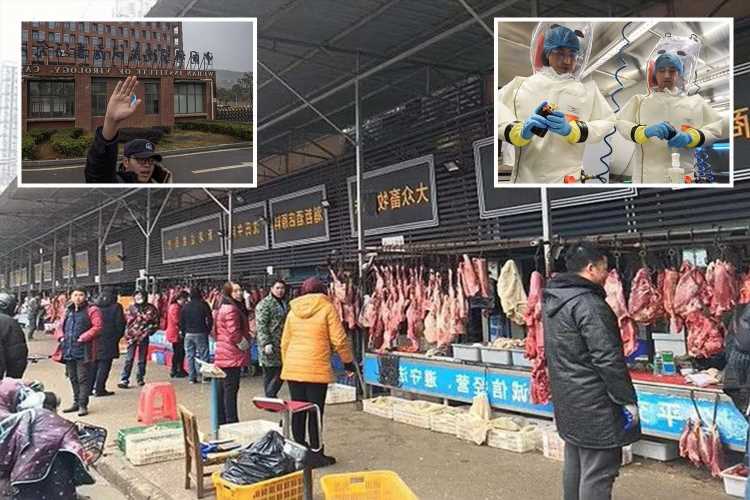BATS and pangolins were not for sale in Wuhan before Covid appeared and were not the source of the virus, new research has shown.
The finding has undermined a key plank of China's explanation for the origins of the pandemic and fuelled suspicion the virus may have leaked from the Wuhan Institute of Virology.
🔵 Read our coronavirus live blogfor the latest updates
The World Health Organisation report into the origins of the pandemic has stressed transmission from animals as being the most likely source, which also the official Chinese line.
In its report into the potential causes of the Covid pandemic WHO, pointed to pangolins and bats as being strong candidates for transmission to humans.
The WHO looked at whether so-called wet markets Wuhan, where such exotic species are for sale, could be the source of Covid and called for the trade in bats and pangolins to be monitored.
But the new study from Oxford University has found that neither species was on sale in Wuhan ahead of Covid emerging there.
The paper, published in the journal Nature-Scientific Reports, has found that there were 31 protected species were on sale in Wuhan – but not bats and pangolins.
Richard Ebright, professor of chemistry and chemical biology at Rutgers University, is one of a growing number of scientists who have said the lab leak theory needs to be fully examined.
In response to the new study he tweeted: “Another false pillar of the false narrative collapses.”
Pangolins have been the subject of research into the origins of Covid given their popularity in Chinese medicine and that they are known to carry coronaviruses.
And scientists have discovered a virus bats have discovered to be 94.5 per cent identical to Covid.
Professor David Macdonald, one of the report’s authors said “not surprisingly….the finger of blame has been pointed at wildlife trade in the wet markets of Wuhan, Hubei”.
But bats are actually rarely consumed in Central China and the pangolin trade is still a significant issue in other Chinese cities and trading nodes, but not in Wuhan, he explained.
He added: “Our investigation….found that both bats and pangolins had an alibi – neither was there!”
The research found 47,381 animals from a total of 38 species including Siberian weasels, Amur hedgehogs, flying squirrels and pit vipers were on sale in Wuhan.
Professor Macdonald said “while we discovered no evidence supporting original spill-over from candidate bats or pangolins in Wuhan, it would seem but a matter of time before some other unwelcome disease might skip into the human population”.
What do we know about the Wuhan Institute of Virology?
THE Wuhan Institute of Virology is the highest security lab of its kind in all of China – and can be found right at the heart of the origins of the pandemic.
Various theories have been reported about the lab, which is headed up by scientist Dr Shi Zhengli, known as “Bat Woman”.
The lab specialises in bat-borne viruses and had been carrying out experiences on them since 2015.
Airlocks, full body suits, and chemical showers are required before entering and leaving the facility – the first in China to be accredited with biosafety level 4 (BSL-4).
BSL-4 labs are the only areas in the world where scientists are permitted to study diseases that have no cure.
Scientists from the lab even tested a mysterious virus which killed three miners 1,000 miles away in Yunnan province back in 2012.
It has been suggested this fatal bug may have been the true origin of Covid-19.
Experts at the lab also engineered a new type of hybrid 'super-virus' that can infect humans in 2015, according to journal Nature Medicine
The study was designed to show the risk of viruses carried by bats which could be transmitted to humans.
There is no suggestion the facility's 2015 work is linked to the pandemic and the facility denies the lab leak claims.
The lab was also recruiting new scientists to probe coronaviruses in bats just seven days before the outbreak.
The suspicion that Covid may have leaked from a lab was initially dismissed as a conspiracy theory but has gained traction to the extent that President Joe Biden has ordered US spies to investigate.
British intelligence has also reportedly recently assessed the theory and upgraded its likeliness from "remote" to "feasible".
China’s refusal to allow a full investigation and increasingly shrill denials have fuelled suspicion that it is seeking to cover up culpability.
Shocking biosecurity lapses spanning over 40 years have also led to some to question the official Chinese line that the disease was passed from animals to humans.
In 2004, two Chinese researchers were exposed to SARS and spread the disease to others, killing one.
There are also suspicions an H1N1 influenza epidemic in the late 1970s may have leaked from a lab, while an outbreak of a bacterial infection in 2020 was attributed to a leak from a vaccine plant.
Source: Read Full Article






